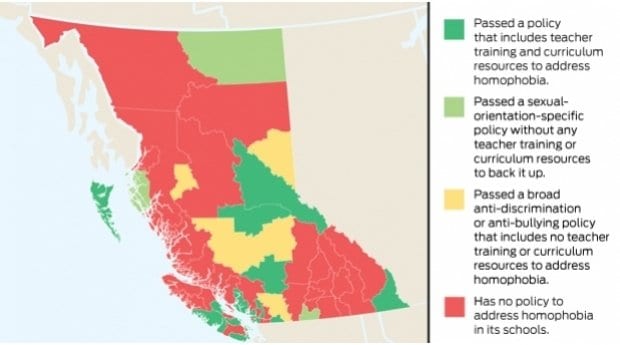A report on cyberbullying released June 23 by the West Coast Women’s Legal Education and Action Fund (LEAF) says the BC government should give school districts six months to comply with the School Act’s requirement to develop a code of conduct if they haven’t already done so.
An Xtra special report in April found that fewer than half of BC’s 60 school districts had passed anti-homophobia policy to protect queer students and foster a queer-friendly learning environment.
As of mid-May, that number had climbed to 31 districts; 29 have yet to explicitly address discrimination based on sexual orientation in their districts.
LEAF’s report, “#CyberMisogyny: Using and Strengthening Canadian Legal Responses to Gendered Hate and Harassment Online,” says the term “cyber misogyny” is a better way to describe behaviours usually rolled into the catch-all term “cyberbullying,” which tends to mask the sexist, racist, homophobic, transphobic and otherwise discriminatory nature of the behaviour.
The report says women and girls, members of minority groups, the LGBT community and people with disabilities are disproportionately targeted for online bullying.
LEAF lawyer Laura Track tells Xtra it was important to include the LGBT community in the study as online harassment online tends to target vulnerable groups — “people perceived to be different.”
“Egale reports that 40 percent of trans students it surveyed had experienced online harassment and bullying,” she says, “and the discriminatory attitudes behind that kind of abuse are sexist and misogynistic. LGBTQ folks are bullied and harassed for failing to conform to gender expectations, for being too ‘effeminate’ or ‘butchy’ or for transgressing commonly accepted norms. It’s all sexism.”
The report says the law has an important role to play: “Holding harassers and hatemongers legally accountable for their actions will serve an important educational function by denouncing these behaviours and sending the message that they will not be tolerated.”
It recommends that BC’s School Act be amended to create a duty for principals, vice-principals and teachers to take disciplinary action on harassing, abusive and misogynist behaviour on or off school property and before, during or after school hours, when that behaviour has a negative impact on a positive school climate and students’ ability to feel safe and to learn.
It’s an issue Premier Christy Clark spoke about when interviewed by Xtra as she was seeking the BC Liberal Party leadership in January 2011. “You have to deal with it properly, and you have to have consequences for bullies. But second, you have to change the cultures of schools,” Clark said then.
“If I become premier, one of the very clear directives I am going to give to the education minister is I want you to deal with bullying in schools as a top priority,” she continued.
“Her words ring rather hollow given that only 17 of 60 school districts have implemented codes of conduct, and only half have policies for addressing homophobia and transphobia against LGBTQ students,” Track says now. “Given the disproportionate impact of cyber abuse on LGBTQ youth, especially trans youth, it’s very disappointing that the government has not acted to protect queer students from discrimination.
“As Egale has noted, generic safe-school policies that do not include specific measures on homophobia are not effective in improving school climate for LGBTQ students,” Track adds.
Clark’s press secretary, Sam Oliphant, did not respond to Xtra’s request for comment.
Ministry of Education spokesperson Scott Sutherland tells Xtra the ministry is aware of LEAF’s report. He says school districts have the autonomy to create their own policies around LGBT discrimination. “Those policies promote inclusiveness of all students and are better implemented at the local level, as individual boards know what supports are needed,” he says.
Sutherland says all 60 districts have codes of conduct in place that, in keeping with the BC Human Rights Code, prohibit discrimination on the basis of sexual orientation. Those codes are “an integral part” of the government’s ERASE Bullying program designed to identify and prevent bullying, he says.
The LEAF report also encourages the BC government to amend the Human Rights Code to explicitly protect transgender individuals by adding “gender identity and gender expression” to the list of prohibited grounds of discrimination. The Ontario government legislated that change in 2012.
The report addresses a wide range of issues pertaining to cyberbullying and makes a variety of recommendations, including that the sections of the federal government’s Bill C-13 not related to privacy be passed without delay.

 Why you can trust Xtra
Why you can trust Xtra


